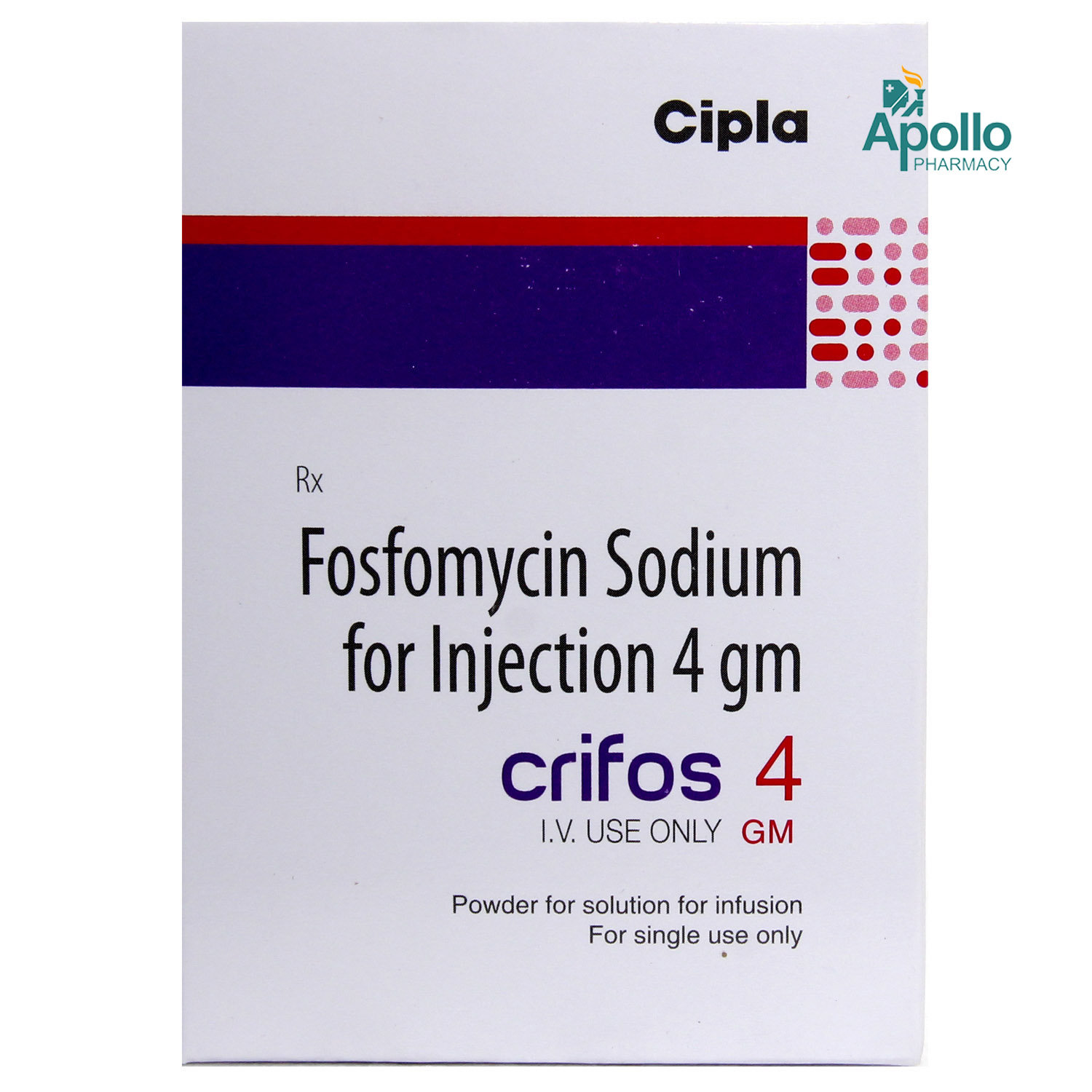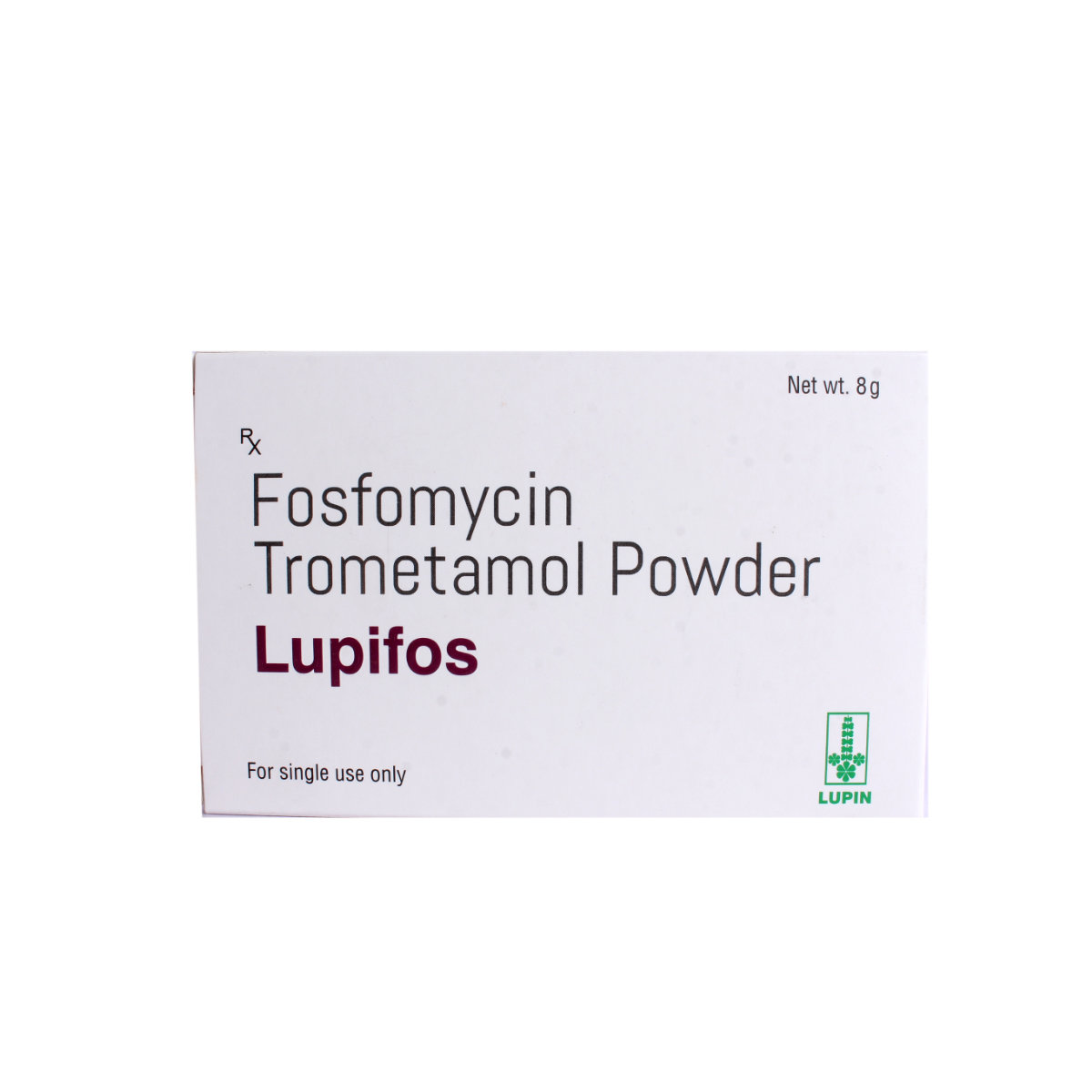Fosfomycin
About Fosfomycin
Fosfomycin belongs to a class of drugs called antibiotics used in the treatment of bacterial infections. Fosfomycin is used to treat bacterial meningitis (infection of membranes protecting the brain and spinal cord), complicated urinary tract infections, bacterial infections of bones and joints, heart, lungs, central nervous system, stomach, blood, skin, and tissues below the skin. Bacterial infection is a condition in which harmful bacteria grow in the body and cause infection. It can infect any part of the body and multiply very quickly.
Fosfomycin contains Fosfomycin which works by inhibiting the formation of the bacterial cell walls (a protective covering) that is necessary for their survival. Thereby killing bacteria. Also, Fosfomycin decreases the attachment of bacteria to cells lining the urinary bladder.
Fosfomycin will be administered by a healthcare professional. Do not self-administer. You may sometimes experience gastrointestinal disturbances, taste disturbances, or injection site reactions. Most of these side effects of Fosfomycin do not require medical attention and gradually resolve over time. However, if the side effects persist or worsen, please consult your doctor.
If you are allergic to Fosfomycin or any other medicines, please tell your doctor. If you are pregnant or breastfeeding, please inform your doctor before taking Fosfomycin. Fosfomycin could be used in children if prescribed by a doctor; the dose depends on the child’s age and weight. If you have experienced diarrhoea after receiving or taking antibiotics, inform your doctor before taking Fosfomycin. If you have kidney problems or are undergoing dialysis, inform your doctor as the dose may be reduced.
Uses of Fosfomycin
Medicinal Benefits
Fosfomycin contains Fosfomycin, a broad-spectrum antibiotic that kills gram-negative and gram-positive bacteria that grow aerobically (in the presence of oxygen) and anaerobically (in the absence of oxygen). Bacterial meningitis (infection of the membranes that protect the brain and spinal cord), complicated urinary tract infections, bacterial infections of bones and joints, heart, lungs, central nervous system, stomach, blood, skin, and tissues beneath the skin are all treated with Fosfomycin. Fosfomycin should be used only when other antibiotics have failed or are ineffective. Fosfomycin prevents bacterial cell wall formation (a protective covering required for survival). Bacteria are thus killed. Additionally, Fosfomycin reduces the attachment of bacteria to the cells lining the urinary bladder.
Directions for Use
- Fosfomycin is administered only by qualified healthcare professionals, usually through intravenous infusion in a hospital or clinic setting.
- This medication must not be self-administered, as it requires careful dosing, preparation, and monitoring.
- It is important to complete the full course of treatment as prescribed, even if symptoms improve, to prevent recurrence or resistance.
Storage
Side Effects of Fosfomycin
- Taste disturbances
- Gastrointestinal disturbances
- Injection site reactions
Drug Warnings
If you are allergic to Fosfomycin or any other medicines, please tell your doctor. If you are pregnant or breastfeeding, please inform your doctor before taking Fosfomycin. Fosfomycin may be used with caution in children if prescribed by a doctor; the dose depends on the child’s age and weight. If you had diarrhoea previously after receiving or taking antibiotics, inform your doctor before taking Fosfomycin. If you have kidney problems or are undergoing dialysis, inform your doctor, as the dose may be reduced.
Drug Interactions
Drug-Drug Interaction: Fosfomycin may interact with anticoagulants (blood thinners).
Drug-Food Interaction: No interactions found.
Drug-Disease Interaction: If you have high blood pressure, hypernatraemia (high levels of sodium in the blood), hyperaldosteronism (excessive production of aldosterone hormone), pulmonary oedema (accumulation of fluid in the lungs), kidney or heart problems or if had diarrhoea previously after receiving or taking antibiotics, inform your doctor before taking Fosfomycin.
Drug-Drug Interactions Checker List:
Safety Advice
Alcohol
cautionThe interaction of alcohol with Fosfomycin is unknown. Hence, avoid or limit alcohol consumption while on treatment with Fosfomycin.
Pregnancy
safe if prescribedFosfomycin is considered safe to be used in pregnancy. However, if you are pregnant, inform your doctor before receiving Fosfomycin. Your doctor prescribes this medicine if the benefits outweigh the risks.
Breast Feeding
safe if prescribedSmall amounts of Fosfomycin are excreted in human milk. Therefore, it is given to breastfeeding mothers only if the doctor thinks the benefits are greater than the risks.
Driving
cautionFosfomycin may cause weakness or confusion in some people. Therefore, avoid driving if you notice any of these symptoms after taking Fosfomycin.
Liver
cautionPlease consult a doctor if you have a history of liver diseases/conditions.
Kidney
cautionTake Fosfomycin with caution, especially if you have a history of kidney diseases/conditions. The dose may be adjusted by your doctor as required.
Children
cautionFosfomycin may be used with caution in children if prescribed by a doctor, and the dose depends on the child’s age and weight.
Habit Forming
Diet & Lifestyle Advise
Take probiotics after completing the full course of Fosfomycin in order to restore some healthy bacteria in the intestines that may have been killed. Taking probiotics after antibiotic treatment can reduce the risk of antibiotic-associated diarrhoea. Certain fermented foods like cheese, yoghurt, kombucha, sauerkraut and kimchi can help restore the intestine's good bacteria.
Include fibre-rich foods, as they can be easily digested by your gut bacteria, which helps stimulate their growth. Thus, fibre-rich foods may help restore healthy gut bacteria after a course of antibiotics. Whole grains such as whole-grain bread and brown rice should be included in your diet.
Maintain a low-sodium diet as Fosfomycin in injection form may increase sodium levels in the blood.
Make sure you drink plenty of water or other fluids daily while you are taking Fosfomycin.
Special Advise
The levels of electrolytes are regularly monitored while taking Fosfomycin as it may cause high sodium or low potassium levels in the blood.
Patients Concern
Disease/Condition Glossary
Bacterial infection: It is a condition in which harmful bacteria grow in the body and cause infection. It can target any part of the body and multiple very quickly. Bacteria come in three basic shapes, namely spherical, rod or spiral-shaped. Bacteria may be gram-positive (have thick cell walls) or gram-negative (do not have cell walls). Appropriate tests are done to identify bacterial strains, and based on the results, proper medication is prescribed. Some common symptoms of bacterial infection include cough, fever and tiredness.
FAQs
Fosfomycin belongs to a class of drugs called antibiotics used in the treatment of bacterial infections. Fosfomycin is used to treat bacterial meningitis (infection of membranes protecting the brain and spinal cord), complicated urinary tract infections, bacterial infections of bones and joints, heart, lungs, central nervous system, stomach, blood, skin, and tissues below the skin.
Fosfomycin contains Fosfomycin, which inhibits the formation of the bacterial cell wall (a protective covering) necessary for survival. Thereby killing bacteria. Also, Fosfomycin decreases the attachment of bacteria to cells lining the urinary bladder.
Fosfomycin may cause taste disturbances as a temporary side effect. However, if the condition persists or worsens, please inform your doctor.
If you are undergoing dialysis or have kidney problems, inform your doctor before receiving Fosfomycin so that the dose may be adjusted.
Fosfomycin may cause diarrhoea as a rare side effect. However, if the condition persists or worsens with fever or severe stomach pain, please consult a doctor immediately, as these might be signs of large intestine infection.
You are not recommended to take blood thinner while receiving Fosfomycin as co-administration of these two medicines may alter the blood thinner's ability to prevent blood from clotting. However, please consult your doctor before taking other medicines while receiving Fosfomycin.
The side effects of Fosfomycin include injection site reactions, taste disturbances and gastrointestinal disturbances. If these side effects persist or worsen, please consult your doctor.
Fosfomycin is a broad-spectrum antibiotic which affects and damages the cell wall (covering of bacteria) synthesis. Thereby, it kills the infection causing bacteria. Additionally, Fosfomycin prevents the attachment of bacteria to superficial cells of urinary bladder, hence preventing infection.
The dosing schedule is decided by your doctor and the dose depends on bacteria causing the infection, site and severity of the infection. Your doctor will consider your body weight, age, and status of kidney function while deciding the dose and duration.
As Fosfomycin is eliminated by the kidneys, the time for which Fosfomycin stays in the body depends upon how well kidney functions. In healthy adults, about 80-90% of the total medication injected is excreted by kidneys within 10 hours following a single injection into the veins. The medicine may remain for a longer time in the body if the patient has kidney dysfunction.







